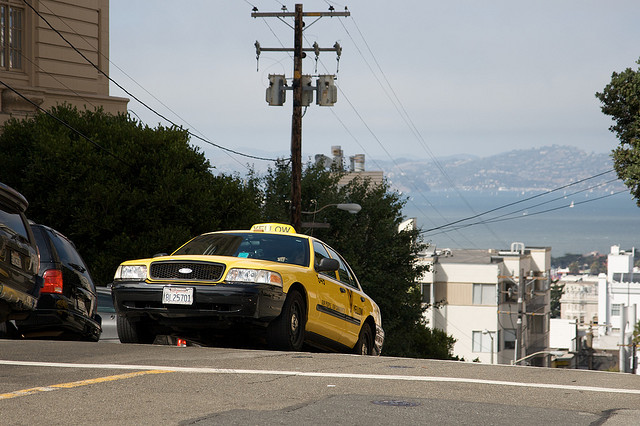Uber bankrupting Yellow Cab
 |
| Yellow Cab in SF |
San Francisco's largest taxi company is edging toward filing for bankruptcy.
Yellow Cab Co-Op said challenges from tech rivals Uber and Lyft, as well as mounting lawsuits from traffic collisions contributed to the fiscal Hail Mary.
Those "rideshare" companies are headquartered in San Francisco — their home turf.
Regular cab operations will not be affected in the near future and Yellow Cab has no plans to close if it can successfully restructure, representatives said.
The bankruptcy filing will allow the co-op to shed its mounting debts. But longtime taxi industry sources, who spoke on background, also said the bankruptcy is a result of fierce competition with digital ride-hail rivals, who are not only drawing away business — but scooping up talented drivers as well.
Less drivers mean less profits for Yellow Cab, the co-op admitted in a letter to its members.
The company told the San Francisco Examiner its ridership numbers are healthy. But in a letter to shareholders obtained by the Examiner, Yellow Cab Co-Op President Pamela Martinez wrote that they must do more with less to survive.
"We are in a midst of serious financial setbacks," she told Yellow Cab members, which she wrote forced the company to file for chapter 11 bankruptcy.
Some of these financial setbacks "are due to business challenges beyond our control and others are of our own making," she wrote. "Today we are faced with fiscal obligations that far exceed expected income."
Martinez wrote that the co-op plans to file for bankruptcy in one month. The letter was dated Dec. 10, 2015. The Examiner learned of it after rumors about the bankruptcy began to spread in the taxi driver community.
Yellow Cab Co-Op is the largest taxi company in San Francisco, with about 530 medallion holding drivers, according to the company. The next largest are DeSoto Cab Co., now Flywheel Taxi, and Luxor Cab. The taxi industry has struggled the past few years against technology rivals like Uber and Lyft, who often offer lower prices for similar services.
Cab drivers, on the other hand, maintain that they undergo more rigorous criminal checks, enjoy more robust insurance, and generally have better knowledge of city streets.
That's been tough to communicate to the public though, cabbies tell the Examiner, and the reportedly 16,000 or so Uber cars driving around San Francisco weekly are fierce competition.
Jim Gillespie, former president of Yellow Cab, confirmed the co-op would file for bankruptcy soon, but did not say a specific date. Gillespie told the Examiner that business would continue as usual for cabbies.
"In reality, we have the best color scheme there is in the world, we've got a lot of loyal customers, we still get a high volume of calls to our color scheme on a daily basis," he said.
Financially, he said the straw that broke the camel's back were a number of lawsuits which ended up hurting the company's bottom line.
"It was a combination of the number of claims but also the high awards and high settlements that got to us well over a million dollars in a couple cases," he said.
On background, multiple sources told the Examiner that cab companies are having a tough time hiring competent drivers and may be hiring drivers with spotty driving records. Gillespie denied this, but he did say the lawsuits were harmful to the co-op.
Gillespie pointed to Fua v Sanchez, a lawsuit stemming from an injured Yellow Cab passenger, Ida Fua, who was paralyzed on the left side of her body after her Yellow Cab collided with deadlocked traffic at 60 mph.
The jury awarded Fua roughly $8 million last year, according to court documents — a blow to Yellow Cab's finances, Gillespie said.
